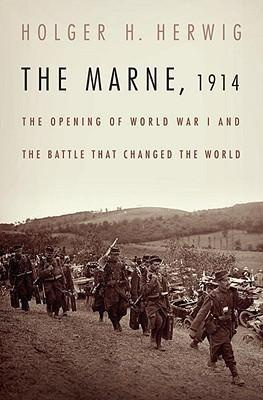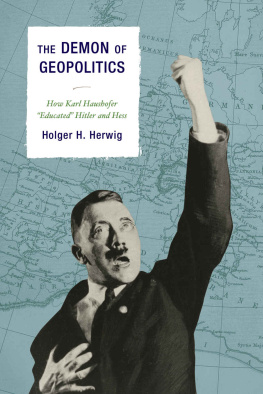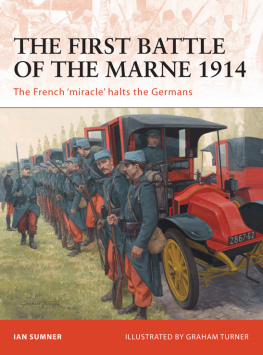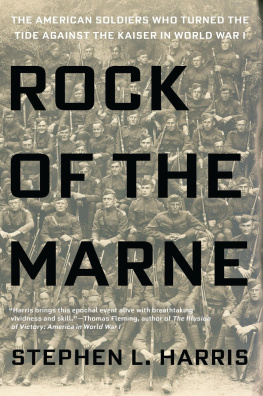
For Jacob Linden Lawrencemy grandson
And in memory of Heinrich
Herwig, killed 22 March 1918 in Lorrainemy grandfather
Time connects our futures to our pasts
CONTENTS

CHAPTER 1
CHAPTER 2
CHAPTER 3
CHAPTER 4
CHAPTER 5
CHAPTER 6
CHAPTER 7
CHAPTER 8
CHAPTER 9
LIST of MAPS

PROLOGUE
A DRAMA NEVER SURPASSED

Woe to him who sets Europe on fire,
who throws the match into the powder box! HELMUTH VON MOLTKE THE ELDER, MAY 1890
O N 2 AUGUST 1914, JUST A FEW HOURS BEFORE GERMAN TROOPS OCCUPIED Luxembourg and thirty hours before war was declared between France and Germany, Lieutenant Albert Mayer of 5th Baden Mounted Jger Regiment led a patrol of seven riders across a small ridge along the Allaine River near Joncherey, southeast of Belfort. Suddenly, French guards of the 44th Infantry Regiment appeared. Mayer charged. He struck the first Frenchman over the head with his broadsword, causing him to roll into a roadside ditch. Another Jger drove his lance into the chest of a second French soldier. A third Jger shot Corporal Jules-Andr Peugeot, making him the first French casualty of the war. The remaining group of twenty French soldiers took cover in the ditch and opened fire on the German sharpshooters. Mayer tumbled out of the saddle, dead. In this unexpected manner, the twenty-two-year-old Jger became the first German soldier killed in the war. And in this bizarre way, the first victim in what would collectively be called the Battle of the Marne.
THE MARNE WAS THE most significant land battle of the twentieth century. I made that claim nearly a decade ago in a special issue of MHQ: The Quarterly Journal of Military History dedicated to Greatest Military Events of the Twentieth Century. Without the Battle of the Marne, places such as Passchendaele, the Somme, Verdun, and Ypres would not resonate with us as they do. Without the Battle of the Marne, most likely no Hitler; no Horthy; no Lenin; no Stalin.
The Marne was high drama. The Germans gambled all on a brilliant operational concept devised by Chief of the General Staff Alfred von Schlieffen in 1905 and carried out (in revised form) by his successor, Helmuth von Moltke the Younger, in 1914: a lightning forty-day wheel through Belgium and northern France ending in a victorious entry march into Paris, followed by a redeployment of German armies to the east to halt the Russian steamroller. It was a single roll of the dice. There was no fallback, no Plan B. Speed was critical; delay was death. Every available soldier, active or reserve, was deployed from the first day of mobilization. The sounds and sights of two million men trudging across Belgium and northeastern France with their kit, guns, and horses in sweltering thirty-degree-Celsius heat, stifling humidity, and suffocating dust was stunning, and frightening. Tens of thousands of soldiers fell by the wayside due to exhaustion, heatstroke, blisters, thirst, hunger, and typhus. Others collapsed with gastroenteritis after devouring the half-ripe fruits in the orchards they passed. Will Irwin, an American journalist observing the German gray machine of death marching across Belgium, reported on something he had never heard mentioned in any book on warthe smell of a half-million un-bathed men. That smell lay for days over every town.
Still, hundreds of thousands pushed on, a ragged and emaciated gray mass buoyed by the short-war illusion that the decisive battle was just around the next bend in the road. The home front waited anxiously for victory bulletins. Newspapers vied with one another for any scrap of news or rumor from the front. The atmosphere was electricin Berlin, in Paris, and in London. Winston S. Churchill, looking back on 1914, opined: No part of the Great War compares in interest with its opening. The measured, silent drawing together of gigantic forces, the uncertainty of their deployment and engagement, and the fickle role of chance made the first collision a drama never surpassed. Never again would battle be waged on so grand a scale. Never again would the slaughter be so swift or the stakes so high. It is hard to argue with Churchill.
The Marne has lost none of its fascination. The famous taxis of the Marne, the six hundred Renault cabs that rushed some three thousand men of French 7th Infantry Division to the Ourcq River in time to save Paris from Alexander von Klucks First Army, remain dear to every tourist who has bravely ventured forth in a Parisian taxi-cab. Joseph Gallini, the military governor of the Paris Entrenched Camp, whose idea it was to use the taxis, remains in the popular mind the brilliant strategist who appreciated the significance of Klucks turn southeast before Paris, and who rallied the capitals forces as well as French Sixth Army to deprive the Germans of victory.
Books on the Marne abound. A keyword search of the catalog of the Library of Congress shows ten thousand titles. A similar perusal of the Google website brings up 174,000 hits. Most of these works are from the British and French perspective. They deal with virtually every aspect of the Battle of the Marne, from the company to the corps level, from the human to the material dimension. Bitter disputes still rage over reputationsfrom those of French chief of staff Joseph Joffre to his British counterpart, Sir John French, and from General Charles Lanrezac of French Fifth Army to Sir Douglas Haig of British I Corps. No stone is left unturned in this never-ending war of ink.
This book is different. For the first time, the Battle of the Marne is analyzed from the perspective of those who initiated it: the seven German armies that invaded Belgium and France. There was no German army before August 1914. Thus, the story is told on the basis of what was a massive research effort in the archives of the various German federal contingents: Baden XIV Army Corps fighting in Alsace, Bavarian Sixth Army and Wrttemberg XIII Corps deployed in Lorraine, Saxon Third Army struggling in the Ardennes, and Prussian First, Second, and Fifth armies advancing in an arc from Antwerp to Verdun. The collapse of the German Democratic Republic in 198990 proved to be a boon for researchers: It gave me access to the records of Saxon Third Army at Dresden, and to roughly three thousand Prussian army files long thought destroyed by Allied air raids in 1945, but returned to Potsdam by the Soviet Union in 1988 and now housed at Freiburg. These allow a fresh and revealing look at the Marne.
This book raises a fundamental question: Was it truly the Battle of the Marne? The campaign in the west in 1914, as illustrated by Lieutenant Albert Mayers death in the Vosges, was an extended series of battles that raged from the Swiss border to the Belgian coast. During its initial phase, commonly referred to as the Battle of the Frontiers, major operations took place in Alsace, Lorraine, Belgium, the Ardennes, and the Argonne. Each is an integral part of the larger Battle of the Marne. In many ways, what is generally called the First Battle of the Marne
The titanic clash of vast armies over an extended 480-kilometer front, then, was not one battle at all. Rather, in the words of Sewell Tyng, a distinguished historian of the Marne, it consisted of a series of engagements fought simultaneously by army corps, divisions, brigades, and even battalions, for the most part independently of any central control and independently of the conduct of adjacent units. Hence, the story is told from the perspective of individual units in separate theaters. These range from the cadets of Frances Saint-Cyr Military Academy advancing on Altkirch, in Alsace, in full-dress uniform to the desperate struggle of German First Armys hundred thousand grimy and grisly warriors marching to the very outskirts of Paris.
Next page









